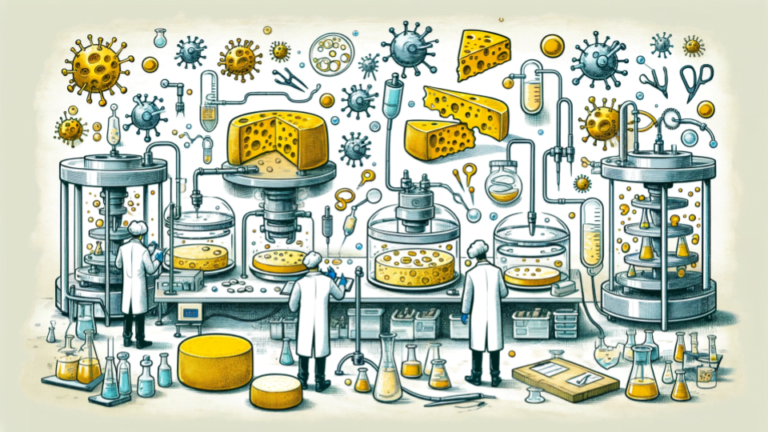Asimov Biotech : Redefining Synthetic Biology By Programming Life
Ever wondered if we could design biology like we design software? That’s precisely what Asimov Biotech is doing. This Boston-based startup is blending synthetic biology with computer-aided design (CAD) to create groundbreaking advancements in genetic engineering.

Lessons From Asimov
Leveraging Computational Tools
The Lesson & Why it Matters:
Computational tools can drastically improve efficiency and accuracy in biotech processes. They enable precise simulations and optimizations.
Implementation:
Adopt advanced software for modeling and simulations. Train teams to effectively use these tools to enhance research outcomes.
How Asimov Implements it:
Asimov’s Kernel software allows users to design, simulate, and optimize genetic systems, integrating thousands of characterized genetic parts.
Interdisciplinary Approach
The Lesson & Why it Matters:
Combining different fields of expertise leads to innovative solutions. Interdisciplinary teams can tackle complex problems more effectively.
Implementation:
Encourage collaboration across various disciplines within your organization. Create cross-functional teams to work on projects.
How Asimov Implements it:
Asimov was founded by experts in synthetic biology and computer engineering, merging their skills to develop advanced genetic design tools.
Addressing Unmet Needs
The Lesson & Why it Matters:
Addressing unmet needs in the market can lead to significant impacts and opportunities. It drives innovation and fills critical gaps.
Implementation:
Identify gaps and unmet needs in your industry. Focus on developing solutions that address these areas effectively.
How Asimov Implements it:
Asimov focuses on developing high-quality genetic parts and predictive models to address critical needs in genetic engineering and therapeutics.
Attracting and Retaining Top Talent
The Lesson & Why it Matters: Top talent drives innovation and excellence. Attracting and retaining skilled individuals is essential for long-term success.
Implementation: Create an attractive work environment with opportunities for growth. Offer competitive compensation and benefits.
How Asimov Implements it: Asimov has grown a cross-disciplinary team of 70 experts in various fields, providing them with the tools and environment to thrive.
Leveraging Advanced Technology
The Lesson & Why it Matters: Using cutting-edge technology can significantly enhance your capabilities and efficiency. It allows for tackling complex problems more effectively.
Implementation: Invest in state-of-the-art tools and technologies. Stay updated with the latest advancements in your field.
How Asimov Implements it: Asimov integrates computer-aided design with synthetic biology, using tools like their Kernel software to design and optimize genetic constructs.
Code to Cure: Designing Biology Like Software
Asimov Biotech focuses on creating tools to design and program living cells. They aim to make biology as predictable and reliable as coding software. The company was founded by a team of bioengineers from MIT and Boston University. (Asimov Biotech)
Asimov’s platform integrates genetic parts, host cells, and sophisticated software. Their tools enable scientists to design, simulate, and optimize genetic systems with precision. This innovation helps in developing new therapeutics, like gene therapies and biologics, which are more efficient and safer.
But what makes Asimov stand out? Their approach combines biology with engineering principles, aiming for a future where genetic engineering is as streamlined as mechanical design. They have developed proprietary technologies and an extensive library of genetic parts. These components can be mixed and matched to create custom genetic solutions. Asimov Biotech is paving the way for the next generation of biotechnologies. Their work unlocks the potential of biology to solve some of the most pressing challenges in healthcare and beyond.
Brainy Beginnings: MIT Minds Spark Asimov’s Bio-Revolution
Asimov Biotech was founded by Chris Voigt, Doug Densmore, Alec Nielsen, and Raja Srinivas, combining their expertise to revolutionize genetic engineering.
Chris Voigt and Doug Densmore
The story begins in the Voigt and Densmore labs at MIT and Boston University. Chris Voigt, a professor of Biological Engineering at MIT, and Doug Densmore, a professor at Boston University, collaborated on developing genetic logic circuits to program living cells. Their groundbreaking work laid the foundation for what would become Asimov Biotech. They aimed to create a toolkit that would enable precise control over gene expression, much like how software engineers control computer systems. (MIT Alumni)
Alec Nielsen
Alec Nielsen joined Voigt’s lab as a PhD student. He was fascinated by the potential of combining biology with computer-aided design (CAD). Alec’s work focused on harnessing the dynamics of gene expression and creating a programming language for cells, similar to software design. This innovative approach inspired the vision for Asimov. Alec’s contributions were pivotal in proving that their platform could reliably design DNA that functioned as expected in living cells.
Raja Srinivas
Raja Srinivas, another key co-founder, completed his PhD alongside Alec at MIT. Together, they pushed the boundaries of synthetic biology, striving to make genetic engineering as predictable as coding. Raja’s expertise in bioengineering added another layer of depth to the founding team’s capabilities.
Founding Asimov
In 2017, with early backing from Andreessen Horowitz and DARPA, the team officially founded Asimov Biotech. The company’s name, inspired by the famous science fiction writer Isaac Asimov, reflects their vision of a future where biology is engineered as systematically as software.
From academic collaboration to pioneering a new industry standard, Asimov’s founders leveraged their deep understanding of biology and engineering to create a company poised to transform the biotech landscape. Today, Asimov continues to push the envelope, developing tools that could one day enable living therapeutics, smart plants, and complex biological manufacturing systems.
Booming Bio: The Trillion-Dollar Biotech Tsunami
Buckle up, because the biotechnology market is booming like never before! As of 2023, the global biotechnology market was valued at approximately USD 1.55 trillion. It’s projected to skyrocket to around USD 5.68 trillion by 2033, growing at a compound annual growth rate (CAGR) of 13.95% from 2024 to 2033. (Grand View Research)
Key Growth Drivers
Several factors are fueling this explosive growth. First, there’s a significant increase in government support and private investments aimed at modernizing the regulatory framework, enhancing research and development, and improving healthcare infrastructure. Innovations in synthetic biology, nanobiotechnology, and gene editing technologies are at the forefront of this expansion.
Regional Insights
North America dominated the biotechnology market, accounting for 41.37% of the market share in 2023. This dominance is due to the high concentration of key players, extensive R&D activities, and substantial healthcare expenditure. The Asia-Pacific region is expected to grow at the fastest rate, driven by increasing investments in healthcare infrastructure and favorable government initiatives in countries like China and India.
Competitive Landscape
Major players in the biotechnology market include industry giants such as Abbott Laboratories, Amgen Inc., AstraZeneca, Biogen, Bristol-Myers Squibb, F. Hoffmann-La Roche Ltd., Gilead Sciences, Johnson & Johnson, Lonza, Merck KGaA, Novartis AG, Novo Nordisk A/S, Pfizer Inc., and Sanofi. These companies are actively engaged in strategic collaborations, mergers, and acquisitions to innovate and expand their market presence. (Polaris)
The biotechnology market is set to revolutionize numerous fields, including healthcare, agriculture, and environmental sustainability. With continuous advancements and increasing adoption of biotechnological solutions, the market offers immense growth opportunities. Stakeholders are focusing on developing new therapeutic platforms, precision medicine, and sustainable agricultural practices, making biotechnology a pivotal industry for the future.
About the Company : Asimov’s Mission to Reprogram Life
Headquartered in Boston, Asimov aims to revolutionize the way we approach genetic engineering. They combine cutting-edge synthetic biology with computer-aided design to create next-generation therapeutics.
Mission and Vision
Asimov’s mission is to advance humanity’s ability to design living systems. They envision a future where biotechnologies provide outsized societal benefits, transforming healthcare and beyond. Their approach integrates state-of-the-art biology with advanced computational tools, setting new standards in the biotech industry.
Problems They Solve
Asimov tackles some of the most complex challenges in biotechnology. They focus on developing precise genetic systems to improve the efficiency and safety of gene therapies and biologics. By enabling programmable genetic circuits, Asimov addresses unmet needs in therapeutics, helping to treat diseases more effectively and with fewer side effects. Their technology also supports advancements in personalized medicine, ensuring treatments are tailored to individual genetic profiles.
Business Model
Asimov’s business model combines product sales with a comprehensive platform offering. They provide proprietary cell lines, genetic parts, and sophisticated software to their partners, which include top pharmaceutical firms and biotech companies. Their business model leverages partnerships and collaborations to expand their market reach and drive innovation. Asimov’s platform allows for the design, simulation, and optimization of genetic systems, making it a valuable tool for companies developing new therapeutics.
Bio Toolbox: Asimov’s Arsenal for Genetic Mastery
CHO Edge System
Asimov’s CHO Edge System is a game-changer for cell line development. It incorporates a GS knock-out CHO host, a hyperactive transposase, and over 1000 characterized genetic elements. This system enables users to explore vector design space efficiently, reducing the risk of low titer cell lines. The CHO Edge System provides everything needed to develop custom cell lines, including vials of GMP-banked host cells, regulatory documentation, and access to their advanced CAD software.
LV Edge System
The LV Edge System addresses the complexities of lentivirus production. This system includes the LV Edge Producer cell line, which eliminates GMP plasmid transfection, achieving high lentiviral titers without the need for traditional multi-step processes. The LV Edge Packaging system offers a clonal, suspension-adapted packaging cell line with stably-integrated lentiviral genes. These systems streamline lentivirus production, reducing costs and improving efficiency.
Genetic Parts Library
Asimov’s genetic parts library is extensive, offering thousands of characterized parts for designing complex genetic systems. These parts include expression vectors, inducible systems, and tissue-specific promoters. The library is integrated with their cloud-based design software, Kernel, which allows users to design, simulate, and optimize genetic constructs. This comprehensive library and software combination ensures high precision and reliability in genetic engineering projects.
Kernel Design Software
Kernel is Asimov’s powerful cloud-based software for genetic design. It provides a user-friendly interface to design, simulate, and optimize genetic systems. Kernel is tightly coupled with Asimov’s genetic parts library, enabling predictive simulations of genetic constructs. This software helps users create robust genetic designs by providing detailed performance data and simulation results.
Cell Line Development Services
Asimov offers comprehensive cell line development (CLD) services. They can develop custom cell lines tailored to specific needs, provide host cells, and assist with DNA design and optimization. Asimov’s services include constructing, preparing, sequencing, and QC of plasmid DNA. They also offer support for generating stable cell lines and provide tools for in-house cell line development.
The Technology : Coding DNA, the Asimov Way
Programming cells as easily as you program computers. That’s what Asimov Biotech is doing, revolutionizing genetic engineering with their advanced technology.
Computer-Aided Design (CAD) for Biology
Asimov employs a unique CAD platform for genetic engineering, much like software used in aerospace or structural engineering. Their platform, Kernel, integrates computer-aided design, host cell chassis, a vast library of genetic parts, multi-scale models for simulation and optimization, and a user interface for multi-omics analysis.
Kernel and Genetic Parts Library
Kernel is the backbone of Asimov’s technology. It offers a user-friendly interface to design, simulate, and optimize genetic constructs. Kernel is linked to a library of thousands of characterized genetic parts, allowing users to build complex genetic systems. This integration ensures high precision and reliability, enabling predictive simulations of genetic constructs.
Genetic Circuits and Simulation
Asimov’s platform designs genetic circuits, akin to electronic circuits, but for biological systems. These genetic circuits ensure that inserted DNA functions correctly within the cell, overcoming common issues like misfolded proteins or low yields. The Genetic Simulator, a part of Kernel, uses machine learning and physics-based models to predict the behavior of genetic systems, refining designs before physical implementation.
Applications in Therapeutics
The technology behind Asimov has vast applications, particularly in developing therapeutic proteins. The platform accelerates the design and optimization of proteins used in treatments, such as antibodies for cancer immunotherapy. By iterating quickly through genetic designs, Asimov’s platform helps create more effective and stable therapeutic proteins.
Integration and Customization
Asimov’s tech allows for seamless integration into laboratories. Scientists can use Asimov’s platform to design custom genetic constructs, perform simulations, and even request DNA sequences. Asimov also provides host cells and regulatory documentation, ensuring that their technology can be easily adopted by biotech companies and research institutions.
The potential for Asimov’s technology extends beyond healthcare. It includes applications in agricultural biotechnology, environmental sustainability, and even food production. By providing precise genetic design tools, Asimov is paving the way for innovative solutions across various industries.
Team Effort: Asimov’s Network of Bio-Buddies
Asimov partners with more than 25 companies, including top pharmaceutical firms, biotech companies, and contract development and manufacturing organizations. These partnerships enable Asimov to provide an integrated suite of technologies, from proprietary cell lines to advanced genetic design software. Their collaborative approach helps streamline the development and manufacturing of complex therapeutic products like bispecific antibodies, gene therapies, and RNA-based treatments.
iGEM Partnership
One of Asimov’s notable collaborations is with the International Genetically Engineered Machine (iGEM) competition. Asimov supports iGEM by providing access to their Kernel software, a cloud-based tool for genetic design and collaboration. This partnership empowers the next generation of synthetic biologists by equipping them with state-of-the-art tools and resources. Asimov also aids in manufacturing and distributing DNA kits for iGEM teams worldwide, ensuring they have the necessary materials to excel in their projects.
DARPA Collaboration
Asimov has secured a contract with the Defense Advanced Research Projects Agency (DARPA) under the Automating Scientific Knowledge Extraction (ASKE) initiative. This project focuses on developing a physics-based AI design engine to improve the reliability of programming complex cellular behaviors. This collaboration aims to enhance the predictive capabilities of genetic engineering, bridging experimental data with advanced computational models.
Center for Breakthrough Medicines
Asimov has formed a strategic partnership with the Center for Breakthrough Medicines to advance the design and manufacture of cell and gene therapies. This partnership aligns with Asimov’s mission to provide next-generation therapeutic solutions, leveraging their synthetic biology platform to tackle complex challenges in the biotech industry.
Asimov collaborates with leading academic institutions and research organizations to drive innovation. These partnerships facilitate cutting-edge research and the development of new genetic engineering technologies. By working closely with top researchers, Asimov ensures that their platform remains at the forefront of synthetic biology advancements.
Financial Fuel: Asimov’s $200M War Chest
Asimov Biotech has been attracting significant investment to fuel its groundbreaking work in synthetic biology. Since its founding in 2017, the company has raised over $200 million in funding. This capital influx underscores the strong confidence investors have in Asimov’s vision and technology.
Seed Funding: Early Beginnings
In 2017, Asimov kicked off its funding journey with two seed rounds. The first seed round in May 2017 raised $4.7 million, followed by another $4.7 million in December 2017. Both rounds saw investments from Andreessen Horowitz (a16z), DCVC, AME Cloud Ventures, and Pillar VC. These initial funds were critical in helping Asimov establish its foundational technologies and start developing its unique platform for genetic engineering. (Tracxn)
Series A: Scaling Up
Asimov’s next major milestone came in June 2020 with a $25 million Series A round led by Horizons Ventures. This funding allowed Asimov to expand its research and development capabilities, enhance its genetic design tools, and scale its operational infrastructure. The Series A investment was instrumental in advancing Asimov’s synthetic biology platform, which integrates computer-aided design with genetic engineering.
Series B: Major Growth and Expansion
The most significant funding boost for Asimov came in January 2023 with a whopping $175 million Series B round. This round was led by the Canada Pension Plan Investment Board (CPP Investments) and included participation from Fidelity Management & Research Company, KDT Ventures, Casdin Capital, Pillar VC, and a16z. This substantial investment reflects the confidence of top-tier investors in Asimov’s potential to revolutionize the biotech industry.
Future Forward: Asimov’s Blueprint for Bio-Dominance
Asimov Biotech stands at the forefront of synthetic biology, merging computer-aided design with genetic engineering to create revolutionary biotechnologies. From its inception at MIT and Boston University, Asimov has leveraged substantial funding to develop a robust platform that transforms the way we design and manufacture therapeutics.
Their innovative approach, combining genetic circuits and predictive simulations, addresses critical challenges in drug development. This technology ensures precision in genetic design, leading to safer and more effective treatments. By enabling programmable medicines and advanced therapies, Asimov is poised to make significant impacts across healthcare and other industries.
If you’re passionate about cutting-edge biotech, now is the time to get involved. Whether you’re a researcher, investor, or biotech enthusiast, there are countless opportunities to drive forward the future of genetic engineering. Explore more about how you can contribute to this exciting field. Check out other insightful articles on Venture Kites to stay updated with the latest technologies.
Questions To Ponder
Creative Head – Mrs. Shemi K Kandoth
Content By Dork Company
Art By Dork Company
100 Startups by IIT Madras in 2024: A Landmark Entrepreneurial
IIT Madras, a leader in India’s education and research, embarks on an ambitious journey. In…
Inside Indie Hackers: How a Transparent Community of Founders is
Indie Hackers, established in 2016 by Courtland Allen, is a thriving online community and resource…
Cursor: How 4 MIT Graduates Built the Fastest-Growing AI Startup
Cursor, an AI-powered integrated development environment (IDE), emerged in 2022 as one of the fastest-growing…
Vercel: This Startup Is Quietly Powering the Internet — And
Founded in 2015 by Guillermo Rauch and Naoyuki Kanezawa, Vercel—originally known as Zeit—set out to…
Tella: How This Tiny Team Is Revolutionizing Screen Recording
Tella is a modern screen recording platform built for today’s content creators and video professionals….
CarDekho: How Two IIT Brothers Changed The Way India Bought
CarDekho, a prominent name in the Indian automotive industry, has revolutionized the way people buy,…
Kovai.co: The Startup That Gave ₹14 crore To Its 140
The idea for Kovai.co started when Saravana Kumar, the CEO, was working as a software…




















Leave a Reply
You must be logged in to post a comment.